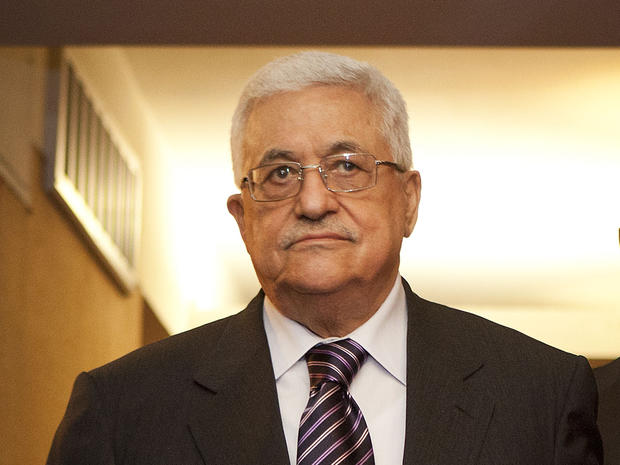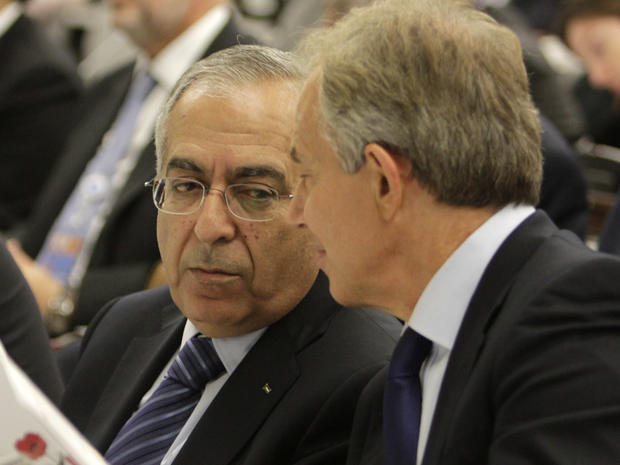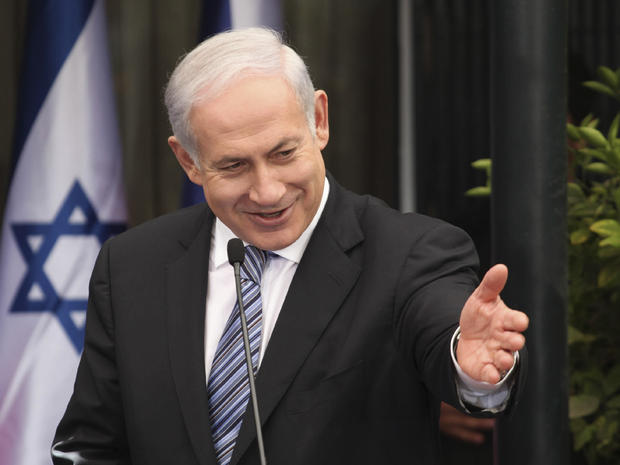U.N. "bust-up" over Palestinian statehood nears
As the clock ticks toward Friday and the Palestinians' looming formal application for statehood at the U.N., all sides involved -- the Palestinians, the Israelis, the European Union negotiators, and President Obama -- know how high the stakes have become in this face-off.
Palestinian leaders have said it is essentially too late to put the brakes on the request, but feverish negotiations continue to find a solution that would avert the spectacle of a failed bid for statehood in the Security Council.
"The key thing is to see if we can find a way out of the possibility of a great showdown confrontation, and get to a situation where there is a big advance for Palestinian statehood and a renewed negotiation," former British Prime Minister Tony Blair, who is now Special Envoy of the Quartet on the Middle East, tells CBS News in an exclusive interview.
Palestinian statehood bid spurs U.S. diplomatic push
Palestinians try to change the rules at the U.N.
Abbas: No stopping our bid for statehood
Blair says he's still hopeful an agreement can be reached that will allow both the Israelis and Palestinians to save face, and, hopefully, move the two sides ever so slightly back towards negotiations.
"We are trying to get a credible offer together. We've got to deal with the main issues - the borders, Jerusalem, refugees, security," says Blair. "What we have got to do is set a framework for the negotiation and probably combine it with a time line that makes it clear we are serious about the negotiation, but right now we have a situation where we don't have agreement."
Intense talks ongoing over Palestinian statehood
Time, concedes Blair, is running out fast.
"We'll either have a bust-up at the U.N. which will probably mean bad news on the ground, and no negotiation, or we can try and find a way through by agreement which has a step forward for the Palestinians at the U.N. and also a renewed negotiation towards a peace deal. My preference is obviously is to go the route that may yield something rather than the route that, in the end, will just end up with a situation that is difficult for everyone."
Aides to Palestinian President Mahmoud Abbas made it clear Tuesday that the "bust-up" was all but unavoidable at this late stage.
Senior aides tell the Associated Press that Abbas remains undaunted by the "tremendous pressure" to drop the statehood bid, including a new call from Israeli Prime Minister Benjamin Netanyahu for renewed direct negotiations.
"Abbas says to every one: it's enough, 20 years of negotiations are more than enough, the world should intervene and end the Israeli occupation as long as the USA can't," Mohammed Ishtayeh, an Abbas aide, tells the AP.
The consequences will be very real, for all parties.
If the statehood bid goes forward, Israel could end up more isolated in the region, diplomats agree. In addition to hostility from Turkey and Egypt, Israel now has another neighbor, Saudi Arabia, offering to make up the difference in some of the aid that would be cut off from Washington and Israel. The public humiliation of a defeat at the U.N. would also increase anti-Israeli and anti-American sentiment on the Arab "street".
Abbas also has much to lose. Although his gambit of going for broke at the U.N. with an outright request for statehood - knowing it would likely fail - might have seemed reversible when he first proposed it, the concept has taken on a life of its own.
His bet was that the United States would be the only veto from the Security Council - helping to drive home his point that the U.S. and Israel stand alone - but that might not be the case.
President Obama, meanwhile, is faulted for predicting a year ago that the Palestinians would be able to declare statehood this year. He's seen as weak by some Israel supporters in the U.S., despite shows of unity from the Israeli government. Americans and world leaders will be listening for leadership in his address on Wednesday.
With a confrontation, Middle East negotiators also lose, for finding no ground to end the decades-long dispute. And the Palestinian people and the Israeli people stand to lose the most.
So how does this all play out at U.N. Headquarters?
One scenario, the most optimistic, is that all the intense back channel negotiations lead Abbas to morph his U.N. Resolution, to be handed to the Secretary-General on Friday, into a proposal for peace talks with a time frame for statehood, perhaps with some aspects of a final status agreement that would be acceptable (but without all the sticky details). Abbas would gain a legacy from his game of chicken, the peace talks would resume, and the $500 million in U.S. aid would continue flowing to the Palestinian Authority.
The second scenario is the one most analysts foresee. The Palestinians' bid for statehood is rejected by the U.N. Security Council, leaving Abbas to turn instead to the much wider U.N. General Assembly for a vote on enhanced status, changing Palestine from an "observer entity" to an "observer state," like the Vatican. While largely symbolic, it would likely work, and the Palestinians - chiefly Abbas - would gain some bragging rights. But tension in the region would dramatically increase, and prospects for true statehood would undoubtedly dim.
The third possibility -- a familiar one to U.N. insiders -- is the slow eke approach, where nothing happens this week, or next. All the world leaders go home, and the Palestinian statehood tinderbox is off the front pages. This would happen if European Union and U.S. negotiators are able to peel off some of the votes of the 15-member Security Council, which is precisely what they're trying to do now. In order for the Security Council to recommend statehood for the Palestinians to the General Assembly, Abbas needs to garner nine votes in favor from the exclusive Council, with no vetoes from the five permanent members.
If he manages anything less, President Obama not only wouldn't need to veto the resolution - it would never come to a vote.
It is possible that the U.S. or another player at the Security Council will introduce an alternate resolution to the one proposing Palestinian statehood, one which proposes peace talks with a timetable instead. If two rival resolutions are put forth at the last minute, enough confusion could be created to make a vote on either impossible.
If that were to happen, Abbas could still go directly to the General Assembly, where he would only need a simple majority (unlike two-thirds for a statehood vote) but that would be weeks, if not months away, giving negotiators time to try and restart the negotiations.
In this last, "slow eke" scenario, all sides lose, but the confrontation is delayed - as things are often done in the Middle East, with no agreement.
For now, feverish negotiations to reach a deal continue, in spite of the Palestinian's insistence the statehood bid will go forward.
Danny Ayalon, Israel's Deputy Foreign Minister, left open the possibility of an "interim solution" which might allow the Palestinians to establish a state within existing borders, and push the difficult issues of final borders, refugees' right to return, the status of Jerusalem and recognizing Israel as a Jewish state off until later.
"Then we can swap or trade security for Israel with sovereignty and independence for the Palestinians in the existing lines and then we can continue negotiations," Ayalon tells CBS News.
"If what is so important for the Palestinians is to establish their state, then so be it, but then they should understand that it has to be in accordance with Israel and that would be to their benefit and to our benefit as we continue to negotiate all the other outstanding issues. We have said we are ready to discuss everything," says Ayalon.
The offer of statehood within the current borders of the Palestinian territories - and without any reference to the all-important issues listed above, was met with a response that made it clear Ayalon's offer was a non-starter.
"Netanyahu has to accept all terms of reference and stop settlement activity including [in] east Jerusalem, to enter negotiations immediately with [a] timeframe not to exceed six months [and] with international guarantees to make any negotiations serious and credible," Palestinian foreign minister Riyad al-Maliki told the Al Jazeera network on Tuesday. That is not what Israel offered.
So, while negotiators insist there's still hope an alternate resolution can be crafted that will bring the Palestinians and the Israelis back to the negotiating table - rather than entrench them further in a showdown - time is running out, and there's no sign yet that their hopes are well-founded.
Edited by CBSNews.com's Tucker Reals in London.


